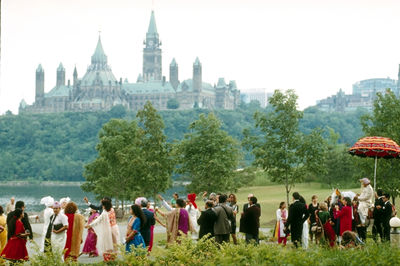Browse "Religion"
-
Article
Divorce in Canada
Marriages in Canada can be dissolved through annulment or divorce, both of which involve a judicial decree.
"https://d2ttikhf7xbzbs.cloudfront.net/media/media/18e234be-ab36-4e5d-aae3-beb23bb8d8b7.jpg" // resources/views/front/categories/view.blade.php
https://d2ttikhf7xbzbs.cloudfront.net/media/media/18e234be-ab36-4e5d-aae3-beb23bb8d8b7.jpg
-
Article
Evangelical and Fundamentalist Movements
Evangelical and Fundamentalist Movements Evangelical and fundamentalist movements include Protestant Christian denominations and subgroups, and nondenominational and paradenominational organizations whose designation indicates their differentiation from "liberal" or "modernist" religious, social and cultural currents, and which define themselves with reference to the Christian scriptures exclusively. Evangelical, the broader category, has the longer and richer history. A derivative of the Greek euangelion ("good news," or "gospel"), "evangelical" is a virtual equivalent of "Christian."
"https://d2ttikhf7xbzbs.cloudfront.net/media/media/52bd2fc9-1778-448b-a5ee-ef6ad0e3af21.jpg" // resources/views/front/categories/view.blade.php
https://d2ttikhf7xbzbs.cloudfront.net/media/media/52bd2fc9-1778-448b-a5ee-ef6ad0e3af21.jpg
-
Article
Evangelical Christian Church in Canada (Christian Disciples)
Evangelical Christian Church, often called the Christian Church (Christian Disciples), is a denomination stemming from the early 19th century Restoration Movement led by Barton Warren Stone and Walter Scott of Kentucky, Thomas and Alexander Campbell of Virginia, and once in Canada, Baptists in Nova Scotia.
"https://development.thecanadianencyclopedia.ca/images/tce_placeholder.jpg?v=e9dca980c9bdb3aa11e832e7ea94f5d9" // resources/views/front/categories/view.blade.php
https://development.thecanadianencyclopedia.ca/images/tce_placeholder.jpg?v=e9dca980c9bdb3aa11e832e7ea94f5d9
-
Article
Evangelical Fellowship of Canada
Evangelical Fellowship of Canada (EFC). The Evangelical Fellowship of Canada is a national association of evangelical Christian churches in Canada. In 1964, the EFC was founded to foster cooperation and collaboration between a variety of evangelical Christians and their denominations.
"https://development.thecanadianencyclopedia.ca/images/tce_placeholder.jpg?v=e9dca980c9bdb3aa11e832e7ea94f5d9" // resources/views/front/categories/view.blade.php
https://development.thecanadianencyclopedia.ca/images/tce_placeholder.jpg?v=e9dca980c9bdb3aa11e832e7ea94f5d9
-
Article
Evangelism and Evangelicals
Evangelism is an English word derived from the combination of the 2 Greek words euangelion and euangelizomai, meaning "good news," or "gospel"] and "to announce, proclaim, or bring good news.
"https://development.thecanadianencyclopedia.ca/images/tce_placeholder.jpg?v=e9dca980c9bdb3aa11e832e7ea94f5d9" // resources/views/front/categories/view.blade.php
https://development.thecanadianencyclopedia.ca/images/tce_placeholder.jpg?v=e9dca980c9bdb3aa11e832e7ea94f5d9
-
Article
Funeral Practices in Canada
Funeral practices consist of customary observances for the dead and arrangements made for disposition of the body. There is a network of social and legal requirements to be met that usually involve the services of various professionals.
"https://d2ttikhf7xbzbs.cloudfront.net/media/media/e9fe97d2-fc7c-40ef-959b-24f89bbe5743.jpg" // resources/views/front/categories/view.blade.php
https://d2ttikhf7xbzbs.cloudfront.net/media/media/e9fe97d2-fc7c-40ef-959b-24f89bbe5743.jpg
-
Article
Gavazzi Riots
The Gavazzi Riots were two major disturbances that occurred in Canada East in 1853. Alessandro Gavazzi, a former Catholic priest and Italian patriot, had embarked on a speaking tour of North America. He scheduled stops in Québec City and Montreal for June. Both of these events were violently disturbed by angry mobs. In each case, soldiers intervened to restore order. In Montreal, on 9 June 1853, soldiers opened fire on the mob that tried to stop Gavazzi’s speech. Ten were killed and many more were wounded. The riots were a major confrontation between the city’s Catholic and Protestant communities. The events highlighted a period of increased religious tension in Canada.
"https://d2ttikhf7xbzbs.cloudfront.net/TCE_placeholder.png" // resources/views/front/categories/view.blade.php
https://d2ttikhf7xbzbs.cloudfront.net/TCE_placeholder.png
-
Article
Great Awakening
Great Awakening, New England-based movement of religious revivalism and evangelical pietism which came to Nova Scotia in 1775 with Henry ALLINE's decision to preach; it subsequently spread across the Maritimes. The religious currents which produced it were international and at least a century old.
"https://development.thecanadianencyclopedia.ca/images/tce_placeholder.jpg?v=e9dca980c9bdb3aa11e832e7ea94f5d9" // resources/views/front/categories/view.blade.php
https://development.thecanadianencyclopedia.ca/images/tce_placeholder.jpg?v=e9dca980c9bdb3aa11e832e7ea94f5d9
-
Article
Hinduism
Hinduism, the religion of approximately one billion people in India, Africa, Indonesia and the West Indies. Immigration from these countries (principally India) to Canada has provided the base for a Canadian population of about 297,200 Hindus (2001 census, last figures available).
"https://d2ttikhf7xbzbs.cloudfront.net/media/media/d17df9ee-bfe1-4057-bd99-89b724f5a697.jpg" // resources/views/front/categories/view.blade.php
https://d2ttikhf7xbzbs.cloudfront.net/media/media/d17df9ee-bfe1-4057-bd99-89b724f5a697.jpg
-
Article
Jansenism
Jansenism, a theological doctrine which urged greater personal holiness, espoused predestination and was linked to some extent with GALLICANISM.
"https://development.thecanadianencyclopedia.ca/images/tce_placeholder.jpg?v=e9dca980c9bdb3aa11e832e7ea94f5d9" // resources/views/front/categories/view.blade.php
https://development.thecanadianencyclopedia.ca/images/tce_placeholder.jpg?v=e9dca980c9bdb3aa11e832e7ea94f5d9
-
Macleans
Japanese Cult Leader Arrested
When they finally found him, he was meditating, seated in the lotus position in a three-foot-high space the size of a large coffin.This article was originally published in Maclean's Magazine on May 29, 1995
"https://development.thecanadianencyclopedia.ca/images/tce_placeholder.jpg?v=e9dca980c9bdb3aa11e832e7ea94f5d9" // resources/views/front/categories/view.blade.php
https://development.thecanadianencyclopedia.ca/images/tce_placeholder.jpg?v=e9dca980c9bdb3aa11e832e7ea94f5d9
-
Article
Jehovah's Witnesses
Jehovah’s Witnesses traces its beginnings to the Advent Movement during the 1800s. Jehovah's Witnesses, religious denomination known internationally for tireless door-to-door EVANGELISM, large conventions, and members' refusal to bear arms, salute flags or accept blood transfusions.
"https://development.thecanadianencyclopedia.ca/images/tce_placeholder.jpg?v=e9dca980c9bdb3aa11e832e7ea94f5d9" // resources/views/front/categories/view.blade.php
https://development.thecanadianencyclopedia.ca/images/tce_placeholder.jpg?v=e9dca980c9bdb3aa11e832e7ea94f5d9
-
Article
The Jesuit Relations
The Jesuit Relations is a collection of the annual reports written by the Jesuit missionaries in Canada and sent to France from 1632 to 1672. These reports are an important historical resource regarding all of the events which occurred in the colony during this period. More specifically, they describe the central role played by the members of the Society of Jesus in the colonization of North America. (See Population Settlement of New France.) These reports provide an overview of the colonial vision of the times and describe the successes and failures of the missionaries in their efforts to convert the First Nations. Printed and distributed in Paris, primarily as a propaganda tool, the Jesuit Relations are very popular with travel literature enthusiasts. They remain a unique source of information regarding the early days of New France.
"https://d2ttikhf7xbzbs.cloudfront.net/media/media/1ab35d09-0c75-441b-b37e-15cacbc481d7.jpg" // resources/views/front/categories/view.blade.php
https://d2ttikhf7xbzbs.cloudfront.net/media/media/1ab35d09-0c75-441b-b37e-15cacbc481d7.jpg
-
Article
Jesuits
The Society of Jesus was founded in Paris in 1534 by Saint Ignatius Loyola, a Spanish soldier who underwent a profound religious experience while recovering from serious wounds. Loyola called the society "The Company of Jesus" to indicate its military spirit. The order was authorized in September 1540 to ordain its members. The name "Jesuits" (meaning those who too frequently use or appropriate the name of Jesus) was used against the order as a term of reproach but in time was accepted by its members.
"https://d2ttikhf7xbzbs.cloudfront.net/media/media/16b8b94b-0ca0-468a-8f8f-09141c3462be.jpg" // resources/views/front/categories/view.blade.php
https://d2ttikhf7xbzbs.cloudfront.net/media/media/16b8b94b-0ca0-468a-8f8f-09141c3462be.jpg
-
Article
Jesuits' Estates Act
Jesuits' Estates Act Jesuits' Estates Act Jesuits' Estates Act How the money was divided: Jesuits $160 000 Laval University $140 000 Various Catholic dioceses $100 000 Protestant higher education $ 60 000
"https://development.thecanadianencyclopedia.ca/images/tce_placeholder.jpg?v=e9dca980c9bdb3aa11e832e7ea94f5d9" // resources/views/front/categories/view.blade.php
https://development.thecanadianencyclopedia.ca/images/tce_placeholder.jpg?v=e9dca980c9bdb3aa11e832e7ea94f5d9
